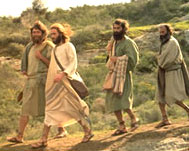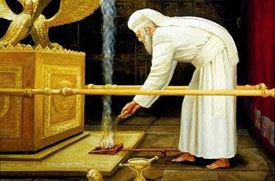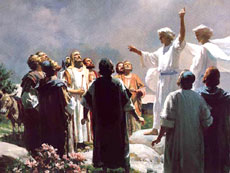
The One Law by Deborah Beach Giordano
Discomfort
I think it was William Sloane Coffin who said that Jesus came to “comfort the afflicted and afflict the comfortable.”
One thing’s for certain: those first disciples never had the chance to know what it was to be “comfortable.” Their time with the Lord was awash in a sea of challenges.
 It began with the nearly unceasing earthly pilgrimages; as Jesus led his followers on journeys throughout the land of Israel and into Samaria — ignoring boundaries, borders, and religious biases.
It began with the nearly unceasing earthly pilgrimages; as Jesus led his followers on journeys throughout the land of Israel and into Samaria — ignoring boundaries, borders, and religious biases.
Wherever they traveled, whoever they met, Jesus preached, prayed, forgave, blessed, and healed — without exception. Women and men, the young and the old, Jews, Samaritans, Roman centurions and religious elders — all were precious in His sight.
Wherever he went, Jesus comforted the afflicted — no matter who they were, where they lived, or what they had done. Without exception.
The Holy, Perfect Center
Jesus’ outreach was confusing: the disciples had been taught that their God was exclusive. “The God of Abraham, Isaac, and Jacob” was a ethnic loyalist who only blessed, healed, and encouraged Jews; as far as other tribes and nations were concerned, they were on their own.
Those within the faith were held to a higher standard than their neighbors. There were strict rules governing every aspect of life: labor, diet, human relations and hygiene.
 It was the business of the priests to maintain the temple boundaries, serving as guardians of God’s good name, protecting the holy center of their people from contamination.
It was the business of the priests to maintain the temple boundaries, serving as guardians of God’s good name, protecting the holy center of their people from contamination.
They alone had the authority to affirm divine forgiveness, and they alone held the knowledge of the appropriate rituals to cleanse and restore sinners to wholeness before God.
No Limits
But Jesus completely ignored these restrictions. He worked on the Sabbath, healed and blessed and pronounced forgiveness, shared meals with drunks and sluts and tax collectors, and exposed himself to every kind of impurity: blood, guts, disease — even death. And not once did he seek priestly restoration.
It was as if His love and compassion was enough to restore sinners to wholeness before God.
It was as if His very touch was enough to heal and purify. It was as if no sin, no shortcoming, no corruption or disease, no madness or wicked acts could separate anyone from the love of God.
The One Law
The Lord Christ did not behave as he did merely to shock the religious authorities, but to teach them: to make them uncomfortable, to make them question what they were doing and why, and to ask what was the result of their actions. For he loved them, too, and yearned for them to join him in building the kingdom of God.
Jesus refused to follow any rule that impeded God’s work in the world (“As long as my Father is at work, so am I” John 5:17), and overruled any attempts to impose restrictions on the relationship between God and God’s people (“Show yourself to the priest, and offer a gift ... in witness [to this cleansing]” Mt 8:1; Mk 1:4 Lk 5:12).
 There is no question that for Jesus Christ, the Law was love — and all else was commentary.
There is no question that for Jesus Christ, the Law was love — and all else was commentary.
It must have been astonishing, amazing, disconcerting and yet exhilarating: the hope and belief that God’s gracious love could — and would, and did — conquer all (John 1:1-5).
Tragedy
Then came the almost-unbearable tragedy of the Lord’s betrayal, arrest, trial, torture, crucifixion, and death. It was as if the sun had gone out; as if the Light of the world had been extinguished.
And for three days the disciples huddled in the darkness of sorrow and despair.
When the Lord appeared to them: alive and whole and real — restored to his old self, their joy must have been as overwhelming as their earlier grief. I’m sure they believed that now Jesus would stay with them forever and ever, that he would continue where he left off, and would soon make the Kingdom of God a reality on earth.
Before they can adjust to this happy good news, Jesus is off and away; leaving them on their own. Again. Witnessing his departure, the disciples see their lives change. Again.
All Over Again
 It happens every time. Every time they start to get too comfortable, too complacent; too confident that the Lord will make everything all right; too certain that He will do all that needs doing, too sure that his kingdom will come without them having to lift a finger ... Jesus puts the responsibility right back into their hands.
It happens every time. Every time they start to get too comfortable, too complacent; too confident that the Lord will make everything all right; too certain that He will do all that needs doing, too sure that his kingdom will come without them having to lift a finger ... Jesus puts the responsibility right back into their hands.
While he was with them, Jesus’ disciples could look on from a safe distance while he broke the rules, took the risks, confronted the Pharisees and challenged the earthly rulers. They could remain on the sidelines while he reached out with love and forgiveness and generosity to everyone, everywhere — without exception.
While Jesus was with them, the disciples could stand and watch, while he put his life on the line.
Look Up to the Lord
Did the disciples understand why the Lord had to go away? Did they realize that his departure was necessary so that they could truly follow His way, rather than wait for him to do it all for them? We do not know for certain.

I do think, though, that the angels were unnecessarily harsh with the men and women who looked up to the Lord as he slipped away from them yet again. They were right, of course, that it would be a mistake to stare, unmoving, at the empty place where Jesus once stood. We cannot live only on the memories of what the Lord has done, or spend our lives idly awaiting his return. We are to pull up our socks, get with the program, and bring the good news to all the world.
And it is essential that we continue to “look up to the Lord,” in admiration, in gratitude, in awe. For God so loved the world — loved us so tenderly and completely — that we were given the gift of a Divine Child, a Holy Advocate, a Friend and Guide to lead us, to bless us, to heal us, to teach us what really matters.
Virtual hugs and real-time blessings,
Deborah +
Suggested Spiritual Exercise
Look up to the Lord.